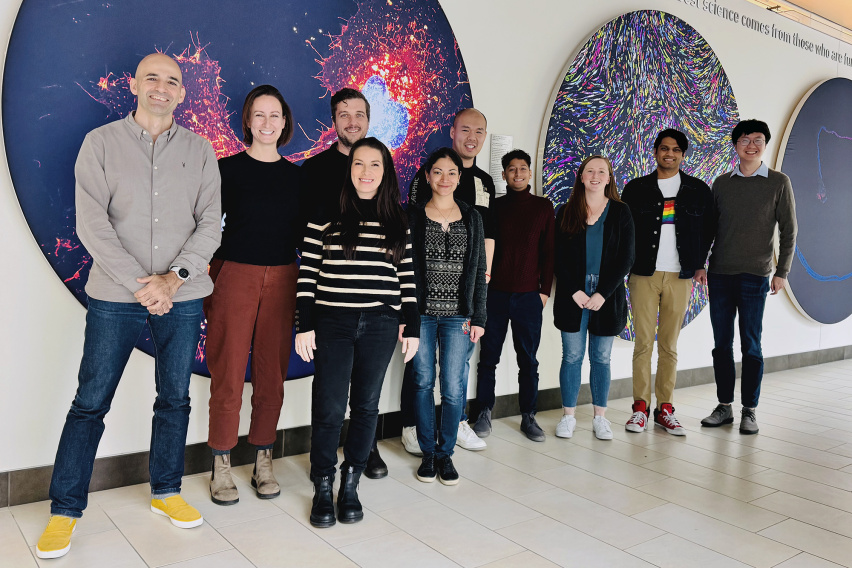
(From left to right) Drs. Tarek Fadel (Founding Director), Allison Greaney (Langer Lab), Corey Stevens (Belcher Lab), Asheley Chapman (Irvine Lab), Elen Torres (Spranger Lab), Bocheng Wu (Koehler Lab), Jonuelle Acosta (Hemann Lab), Margaret Billingsley (Hammond Lab), Vardhman Kumar (Bhatia Lab), Yizong Hu (Anderson Lab).
MIT Koch Institute
November 13, 2023
The Marble Center for Cancer Nanomedicine and the MIT Center for Precision Cancer Medicine (CPCM) are pleased to announce the 2023-2024 class of Convergence Scholars. Founded in 2017, the Convergence Scholars Program (CSP) is designed to enhance the career development of aspiring independent scientists with diverse interests across academia, industry, science communication, and STEM outreach. To achieve this mission, CSP organizes thematic workshops, one-on-one mentoring, networking opportunities, and interactive group social hours. Scholars are also encouraged to develop new research collaborations with other class members, particularly at the intersection of biology and engineering, and refine their “brand” of science and its impact on society. By tailoring individual goals with training opportunities and connections through MIT, the CSP ultimately seeks to prepare postdocs for a critically important yet often overlooked component of a scientist – life beyond the bench.
As part of their award package, CSP scholars will receive a supplemental stipend for use towards their career development. New to this year, stipends are covered by philanthropic support, including a generous gift from Michael and Lisa Ullmann. The Koch Institute and CSP leadership are grateful to our broader community for their support in bolstering postdoctoral resources and investing in future scientific leaders.
Please join us in congratulating the Class of 2024 Convergence Scholars:
- Jonuelle Acosta (Hemann Lab): Jon is leveraging precision genome editing technologies to investigate the role of specific genetic variants on cancer progression and response to therapy, with a focus on leukemia and lung cancer.
- Margaret Billingsley (Hammond Lab): Margaret is synthesizing polymeric layer-by-layer nanoparticles for the targeted delivery of combinatorial therapies—including small molecules and proteins—to ovarian cancer in the minimal residual disease stage.
- Asheley Chapman (Irvine Lab): Asheley is developing novel therapeutic strategies using antigen-drug conjugates to target ineffective B cells and optimize vaccine-induced immunity in germinal centers.
- Allison Greaney (Langer Lab): Allie is engineering lung tissue models that recapitulate both normal physiology and pathology such as cancer, with a long-term goal of generating functional tissues for transplant and disease applications.
- Yizong Hu (Anderson Lab): Yizong is analyzing the underlying mechanisms of early-stage inflammation by mRNA vaccines – both at the mRNA and carrier levels – with a goal of reducing reactogenicity without sacrificing immunogenicity.
- Vardhman Kumar (Bhatia Lab): Vardhman is constructing multiscale, functional biological platforms consisting of shear thinning biomaterials, stem cells, and enzyme sensors to serve as a bridge to liver transplantations, particularly relevant in cases of localized hepatocellular carcinoma or cholangiocarcinoma.
- Corey Stevens (Belcher Lab): Corey is characterizing unique glycosylation patterns on the surface of cancer cells and identifying their unique protein binders for applications in early cancer detection.
- Elen Torres (Spranger Lab): Elen is studying the immunosuppressive mechanism of a known stem cell regulator, SOX2, in mediating poor anti-tumor immune responses in non-small cell lung cancer patients.
- Bocheng Wu (Koehler Lab): Bocheng is screening small molecule compounds to inhibit transcriptional drivers of T cell exhaustion and thus restore anti-tumor T cell functions.
We anticipate that the 2024 class will be a great addition to the program’s rich history of success, some of which are highlighted at the Marble Center for Cancer Nanomedicine website.